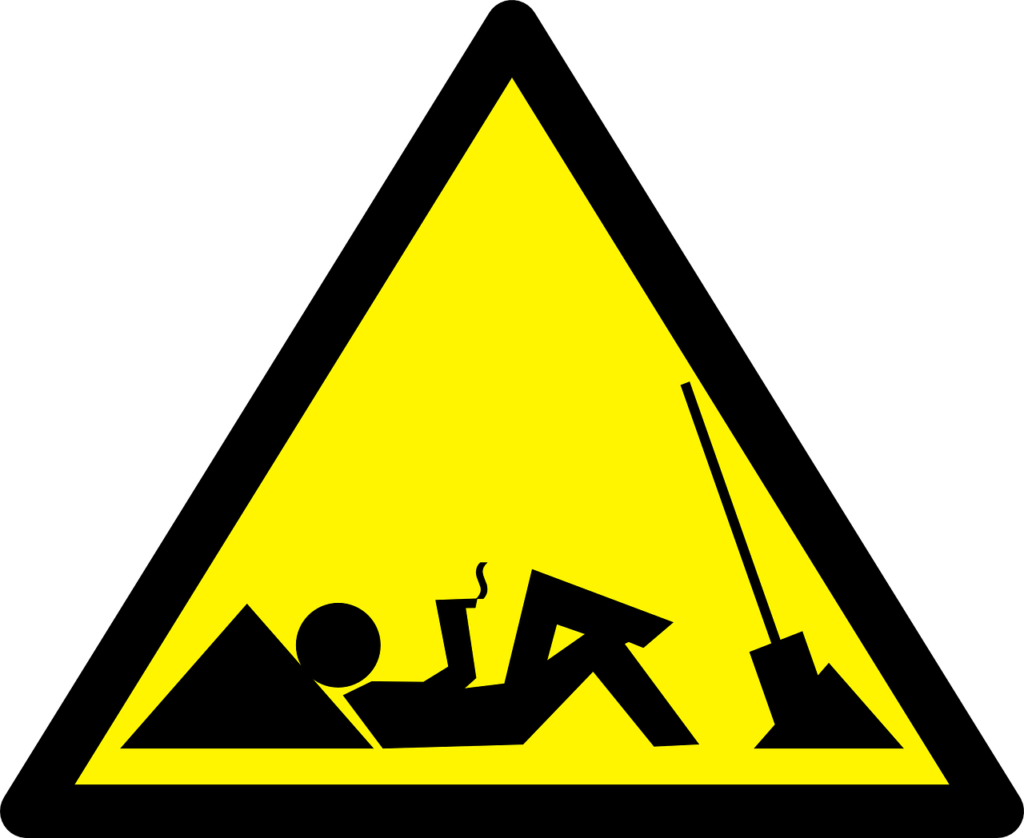
Non-limiting your career – keep the love alive.
Now, is there anything about the above image that you would say is career limiting?! I didn’t think so – except that may he’s below the legal age to work. A lot of things in that image are the antithesis of what I’ve recently encountered in the workplace.
So, a few weeks ago, a less than one year employee skips work several times without authorisation, and further fails to follow procedures, that put a piece of the business in jeopardy. He then comes to me to ask for a raise. When I request a justification for his request, he simply responds, ‘I’m learning more on the job, and life has its demands’. Not long after, another employee of a couple of decades experience, similarly contravenes procedures, and does so repeatedly. I can neither counsel nor coach him to mend his ways. Now, this veteran employee further starts consistently leaving work early, and expects to be paid the same as for full time work.
The nuts and bolts of their actions

Checked out a long time ago 
Indifferent
So, I began to wonder what could be the source of this sudden miscreancy. I always begin by asking myself, what have I done that may have sparked off such a situation. But I could think of no divergence from normal in my management style. After deep reflection, I came to an easy conclusion on the veteran, but a more complex one on the newbie. The veteran had very many years earlier deliberately moved into career limiting mode. He wanted to be in cruise control and neither exert nor apply himself too much in the workplace.
The newbie, on the other hand, had started out well, but somewhere along the line seemed to have become indifferent to things. Now, we’re talking about two inscrutable characters here, who play their cards close to their chests. Neither wears their heart on their sleeve, so I had some deep figuring out to do.
After several tough and crucial conversations, I finally figured out the newbie. The veteran’s “checked-out” approach and career limiting tendencies were like a cancer, and were not motivating for the newbie. In turn, he became susceptible to the day to day problems, both outside of and within the workplace, building his indifference to things. He saw the veteran cutting corners and having a don’t-care attitude and the effect of this rubbed off on him. Soon, he became focused on just taking home the paycheck. Ergo, the incident where he simply asked for a raised after messing up. 💡 Light bulb moment! I therefore had to figure out, first whether he was salvageable, and if so, how to reel him back in.
Getting yourself focused

As an employee, you must figure out what drives you, so that you can stay motivated in any setting. If the setting isn’t right for you, come to terms with it early on. Either address it with the powers that be, or take action to change your circumstances. If the environment is one that you could not only adapt to, but thrive in, then pull up your big boy (girl) pants and stop with the career limiting moves!
Your employer owes you nothing but your paycheck, paid regularly as promised, and an enabling environment to do your work. Otherwise your boss will start docking you respect and admiration points for the little things, that then become big things. Often showing up late. Lacking the focus on team objectives. Not having a can-do attitude. Detracting from, rather than making the team better as a whole. Simply going through the motions (yes, we can see it, even if you don’t think we can). Although many of these attributes are not written into job descriptions, they are used to separate the wheat from the chaff.
Simply ask yourself, ‘Why are my reasons for doing this?’ and you will be able to focus on the important things you must do. Then ask yourself, ‘Where will this take me?’ and it will give you vision and direction. Finally ask yourself, ‘What can I get out of this?’ and you will have the clarity to see you through to a career destination.
Figuring it out

So, that last bit sounds a lot easier said than done. Here are a few tips that I have for re-discovering that focus, love and passion.
- Try and imagine the next worst thing you could be doing for a living.
- Put on your big boy pants.
- Recall why you were happy to take up this position in the first place.
- Put on your big girl pants.
- It’s all about mindset. Focus on all the possibilities of your job – and then speak to your boss about it. It’s amazing what open communication can do; not only in opening doors, but also in building trust.
- Understand that all growth and happiness in this world is about give and take. What are you giving, rather than taking?
- Understand where you want that job to take you. Have a 1-3-5 year plan; and then do the best damn job where you are right now.
- Always have an opinion and be solutions-oriented.
- Let your character positives be evident, obvious and readable to others.
- Be someone who other people like being around and working with.
Selfless, enduring love

The ancient Greeks defined a whole lot of different types of love; some negative and some positive. https://www.lifehack.org/816195/types-of-love
The other day, a friend was trying to help some people understand that, of these, there are those non-romantic types of love that build communal affinity. To me, these others are a more selfless, enduring type of love, of which I speak at the top.
- Storge – empathy bond: Familiarity with and getting to understand your colleagues.
- Philia – friend bond: Seeing your colleagues as equals, with whom you have common goals.
- Pragma – enduring love: Putting in equal commitment as given to you, and knowing that there aren’t necessarily greener pastures.
- Agape – unconditional “God” love: Selflessness and altruism.
How they manifest
To take these from the theoretical to the practical, here is how the solutions and the types of love defined above then play out when you are not career limiting.
- It’s fundamentally about acts of service. Are you doing the basic, correct things that are expected of you? Do these well, before you try and go over and above the call of duty. I’ve known many a perceived “less-than-high-performer” go far in their career, simply because they could always be counted on do what was expected of them.
- Your words reflects your thought and intent. Be careful not only of the words you speak directly to your superiors, but also what trickles up to them through the grapevine. Remember that words in confidence are no longer in confidence, once they hit even one other person’s ears. Let every word attributed to you be positive.
- Carry yourself with pride and enthusiasm to be there, because your body language is the window to your soul.
- Always be on time and be prepared before you get there. It’s a cliché, but not showing up on time indicates that you have no respect for other people’s time. Not being prepared is the kiss of career limitation.
- Build trust. If the company cannot trust your actions and intent when given the freedom to act, you’ll never be given independence of action.
- Be a joy to be around. There’s nothing worse than a colleague or employee who you dread, fear or can’t stand dealing with. Never be a mood-killing, can’t-do, always-critical, back-stabbing, non-team-player colleague or employee.
- Give to the company in spirit, what you would like to receive in return. Employment is a two way street. If you want a company to take you far, then you’ve got to give them commitment for them to take you there.
- By the time you leave work each day, be content that through your actions, that day in the future when you eventually leave the company everyone will speak well of you.
The outtake

So getting back to the two guys from the beginning of this story. Well, the veteran has worked himself out of a career. We’ll be offloading him at the next station. A new person with a great attitude has been brought on board. Once this new employee get’s proficient at his job, he will gradually make the veteran obsolete and unneeded. Lesson learned: nobody, no matter how good, is inexpendable.
On a positive note, the one year employee seems to have on his own, following a couple of in-depth conversations, figured out much of what I’ve written above. We had a sit down and I made it clear to him that what he would like out of the job, is what he would put in. I made it clear to him that if he simply does what is expected of him, he can pretty much chart the path of his career. However, to avoid him falling back, I had to first neutralise the cancer on the team, to prevent it from dragging him down. Thus the action on the veteran. It also required a couple of acts of goodwill on my part, showing commitment as the employer, on some little things that didn’t require that much of me.
In return for my visible commitment to giving the newbie the opportunity for a career, he has begun to exhibit the soft skills of someone who not just enjoys, but loves the work that he is doing. Maybe not every second of the day, but the overall destination that our work is taking us to. He shows all the signs of being invested in, and fully on board with the work we are doing together, and for that his career will not be limited.
Some tips for that little boy
Oh, and that little boy in the feature image. He’s got the look, the pose, the passion and the love for what he wants to be. Here’s a few tips in this areas that I believe can stand him in good stead. https://bizlifesmarts.com/At40shouldhaveknownby20
For strategic advisory that will leverage uncommon sense and drive your bottom line, get in touch with us on [email protected]
Follow on:



